九年级unit1
九年级英语上学期Unit1重难点分析

九年级英语上学期Unit1重难点分析引言九年级英语上学期的Unit1是学生们的新起点,它是整个学期的开篇单元。
这个单元主要涉及一些基础的语法知识和词汇,以及阅读和写作技巧的提升。
本文将对此单元的重难点进行分析,并给出相应的学习建议,希望能为学生们的学习提供一些帮助。
重点一:一般过去时在Unit1中,学生将学习一般过去时的用法。
一般过去时表示过去发生的动作或存在的状态,它的构成是动词的过去式。
例如:“I played basketball yesterday.”(我昨天打篮球。
)这一部分的重点在于学生们掌握一般过去时的构成形式以及正确使用时态符号。
学生们可以通过大量的阅读和写作练习来巩固这个知识点。
重点二:词汇积累Unit1中涉及的词汇相对较多,包括名词、动词、形容词等。
学生们需要掌握这些词汇的读音、词义以及用法。
他们可以通过默写、记忆卡片和词汇游戏等方式来巩固词汇。
另外,建议学生们使用这些词汇进行句子的构造和写作练习,以便更好地理解和运用这些词汇。
重点三:阅读理解与写作在Unit1中,学生们将进行一些阅读理解和写作练习。
阅读理解部分要求学生们从文章中获取关键信息,并回答问题。
写作部分要求学生们根据提示写出一段短文。
这一部分的重点在于学生们理解文章的主题和细节,并能够用正确的语言表达出来。
建议学生们多做阅读理解和写作练习,培养自己的阅读和写作能力。
难点一:一般过去时和现在完成时的区别在Unit1中,学生们将学习一般过去时和现在完成时的区别。
一般过去时表示过去发生的动作或存在的状态,而现在完成时表示过去发生的动作对现在产生的影响或结果。
例如:“I went to Paris last year.”(我去年去了巴黎。
)和“I have been to Paris.”(我去过巴黎。
)这一部分的难点在于学生们准确理解和使用这两个时态。
建议学生们通过对比这两个时态的句子进行练习,以加深对它们的理解。
难点二:定语从句Unit1中的写作部分要求学生们使用定语从句来扩展句子。
Unit1(单元知识清单)九年级英语全一册系列(人教版)

Unit 1 How can we become good learners?重要知识点清单【精讲01 词汇】►►►1.aloud adv.大声地;出声地►►►2. sound作连系动词,“听起来”,其后常跟形容词。
—Listen! What a beautiful sound! ——听!多么美妙的声音!—Yes. It sounds like a bird. ——是的。
它听起来像一只鸟。
【知识拓展】英语中常用的连系动词:一是(be),一感(feel),三保持(keep\remain\stay),二:……起来:(sound, look, smell, taste),三:好像(seem),变了:(get, turn, become)。
四:prove come true go hungry►►►常用结构:be afraid to do sth. 意为“害怕做某事”I am afraid to travel by plane. 我怕乘飞机旅行。
【知识拓展】—Excuse me, may I take the dogs with me, sir? —不好意思,先生,我可以携带狗吗?—It’s afraid not. Pets are not allowed in here. You can keep it in the Animal Center next door.—恐怕不行。
宠物不得进入这里。
你可以把它放在隔壁的动物中心。
►►►4. discoverdiscover是指“发现”原来就有而一直没被发现的东西(如电、煤、石油等矿藏及新星、星系或科学真理等)Scientists have discovered different kinds of ways to treat the illness since 50 years ago.自50年前以来,科学家们已经发现了不同的治疗方法。
Edison invented the light bulb. 爱迪生发明了电灯泡。
九上unit1单词表人教版
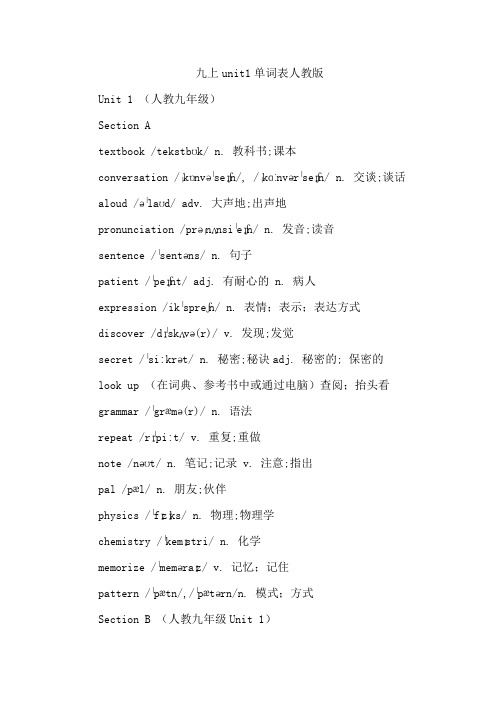
九上unit1单词表人教版Unit 1 (人教九年级)Section Atextbook /tekstbʊk/ n. 教科书;课本conversation /ˌkɒnvəˈseɪʃn/, /ˌkɑːnvərˈseɪʃn/ n. 交谈;谈话aloud /əˈlaʊd/ adv. 大声地;出声地pronunciation /prəˌnʌnsiˈeɪʃn/ n. 发音;读音sentence /ˈsentəns/ n. 句子patient /ˈpeɪʃnt/ adj. 有耐心的 n. 病人expression /ikˈspreʃn/ n. 表情;表示;表达方式discover /dɪˈskʌvə(r)/ v. 发现;发觉secret /ˈsi:krət/ n. 秘密;秘诀adj. 秘密的; 保密的look up (在词典、参考书中或通过电脑)查阅;抬头看grammar /ˈgræmə(r)/ n. 语法repeat /rɪˈpi:t/ v. 重复;重做note /nəʊt/ n. 笔记;记录 v. 注意;指出pal /pæl/ n. 朋友;伙伴physics /ˈfɪzɪks/ n. 物理;物理学chemistry /ˈkemɪstri/ n. 化学memorize /ˈmeməraɪz/ v. 记忆;记住pattern /ˈpætn/,/ˈpætərn/n. 模式;方式Section B (人教九年级Unit 1)pronounce /prəˈnaʊns/ v. 发音increase /ɪnˈkri:s/ v. 增加;增长speed /spi:d/ n. 速度partner /ˈpa:(r)tnə(r)/ n. 搭档;同伴born /bɔː(r)n/ v. 出生 adj.天生的be born with 天生具有ability /əˈbɪləti/ n. 能力;才能create /kriˈeɪt/ v. 创造;创建brain /breɪn/ n. 大脑active /ˈæktɪv/ adj. 活跃的;积极的attention /əˈtenʃn/ n. 注意;关注pay attention to 注意;关注connect /kəˈnekt/ v. (使)连接;与⋯⋯有联系connect … with 把⋯⋯和⋯⋯连接或联系起来overnight /ˌəuvə(r)ˈnaɪt/adv. 一夜之间;在夜间review /rɪˈvju:/ v. & n. 回顾;复习knowledge /ˈnɒlɪdʒ/, /ˈnɑːlɪdʒ/n. 知识;学问lifelong /ˈlaɪflɒŋ/ adj. 终身的;毕生的wisely /ˈwaɪzli/ adv. 明智地;聪明地Annie /ˈæni/ 安妮(女名)Alexander Graham Bell /ˌælɪɡˈzændə(r)/, /ˈɡreɪəm/, /bel/ 亚历山大•格雷厄姆•贝尔。
Unit1单词及词性转换知识点汇总人教版英语九年级全册
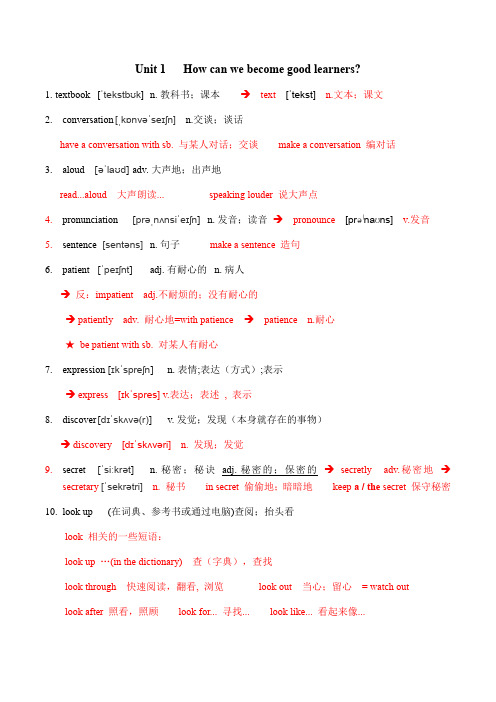
Unit 1 How can we become good learners?1.textbook [ˈtekstbʊk]n.教科书;课本→text [ˈtekst]n.文本;课文2.conversation[ˌkɒnvəˈseɪʃn] n.交谈;谈话have a conversation with sb. 与某人对话;交谈make a conversation 编对话3.aloud [əˈlaʊd]adv.大声地;出声地read...aloud 大声朗读...speaking louder 说大声点4.pronunciation [prəˌnʌnsiˈeɪʃn]n.发音;读音→pronounce [prəˈnaʊns]v.发音5.sentence[sentəns]n.句子make a sentence 造句6.patient[ˈpeɪʃnt]adj.有耐心的n.病人→反:impatient adj.不耐烦的;没有耐心的→ patiently adv. 耐心地=with patience →patience n.耐心★be patient with sb. 对某人有耐心7.expression [ɪkˈspreʃn]n.表情;表达(方式);表示→ express [ɪkˈspres] v.表达;表述, 表示8.discover[dɪˈskʌvə(r)]v.发觉;发现(本身就存在的事物)→discovery [dɪˈskʌvəri] n. 发现;发觉9.secret[ˈsiːkrət]n.秘密;秘诀adj.秘密的;保密的→secretly adv.秘密地→secretary [ˈsekrətri] n. 秘书in secret 偷偷地;暗暗地keep a / the secret 保守秘密10.look up (在词典、参考书或通过电脑)查阅;抬头看look 相关的一些短语:look up …(in the dictionary) 查(字典),查找look through 快速阅读,翻看, 浏览look out 当心;留心= watch outlook after 照看,照顾look for... 寻找... look like... 看起来像...look at... 看... take / have a look (at…) 看一看...look forward to (doing) sth. 期待(做)某事look back on/at 回顾,回忆,回首(往事)11.grammar[ˈɡræmə(r)]n.语法12.repeat[rɪˈpiːt]v.重复;重做13.note [nəʊt]n.笔记;记录v.注意;指出→ notebook n. 笔记本make notes = take notes 记笔记14.pal[pæl]n.朋友;伙伴 a pen pal 笔友15.physics[ˈfɪzɪks]n.物理;物理学→ physical [ˈfɪzɪkl]adj. 身体的;物理学的16.chemistry [ˈkemɪstri] n.化学→chemical [ˈkemɪkl]adj.化学的→ chemist [ˈkemɪst]n. 化学家,药剂师17. memorize ['meməraiz] v. 记忆;记住→memory [ˈmeməri]n.记忆复数: memories18.pattern[ˈpætn]n.模式;方式19.pronounce[prəˈnaʊns] v.发音→ pronunciation[prəˌnʌnsiˈeɪʃn]n.发音;读音20.increase[ɪnˈkriːs]v.增加;增长→反: decrease v. 减少;降低/ reduce v. 减少;缩小★increase by…增加了…increase to….增加到….21.speed[spi:d]n.速度v.加速(speed-sped-sped)speed up 加速at speed 高速,快地at a speed of ... 以....速度22.partner[pa:(r)tnə(r)]n.搭档;同伴→ part n.部分;角色;地区v.分开23.born [ bɔ:n] v.出生adj. 天生的→ birth n.出生give birth to...生育...at birth 在出生时= when sb./sth. was born → birthday n.生日be born in + 年/月be born on + 日期be born with…天生具有…be born + adj. He was born blind.24.be born with 天生具有25.ability[ə’biləti]n.能力;才能★have the ability to do sth. 有做某事的能力→ able adj. 有能力的,能够的→反:unable → disabled adj. 肢体残疾的be able to do sth. 有能力做某事→反:be unable(=not able)to do sth.26.create [kriˈeɪt] v.创造;创建→creation [kriˈeɪʃn]n..创造→ creator n.创造者→ creative [kriˈeɪtɪv] adj.有创造力的→ creativity [ˌkri: eɪˈtɪvəti] n.创造力,创造性27.brain[breɪn]n.大脑brain storm 头脑风暴28.active[ˈæktɪv]adj.活跃的;积极的→ act n. & v. 行为;举动→ actor/actress n.男演员/女演员→ action n. 行动;行为→ activity n. 活动(复数): activities29.attention [əˈtenʃn]n.注意;关注30.pay attention to(to是介词)注意;关注31.connect [kəˈnekt]v.(使)连接;与⋯⋯有联系→ connection n.连接;联系32.connect … with... 把...和...连接或联系起来33.overnight[ˌəʊvəˈnaɪt]adv.一夜之间;在夜间→ night n. 夜;黑夜at night/ in the night在夜里→ tonight adv.在今夜;在今晚→ midnight n. 半夜at midnight 在半夜until midnight 直到半夜34.review[rɪˈvjuː] v. & n.回顾;复习= go over →反:preview v.&n. 预习;预览→view n.看法,意见;视野v. 看待;查看→ interview n.&v. 面试;采访35.knowledge[ˈnɒlɪdʒ][U.]知识;学问→ knowledgeable [ˈnɒlɪdʒəbl] adj. 有知识的;知识渊博的36.lifelong adj.终身的;毕生的37.wisely adv. 明智地;聪明地→ wise adj.明智的→ wisdom n.智慧。
人教版九年级英语Unit1单词、课文_知识梳理_词汇句式精讲
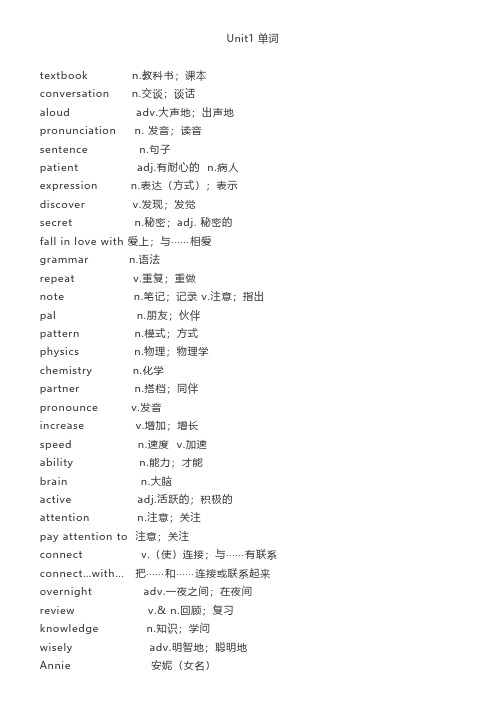
Unit1 单词textbook n.教科书;课本conversation n.交谈;谈话aloud adv.大声地;出声地pronunciation n. 发音;读音sentence n.句子patient adj.有耐心的 n.病人expression n.表达(方式);表示discover v.发现;发觉secret n.秘密;adj. 秘密的fall in love with 爱上;与⋯⋯相爱grammar n.语法repeat v.重复;重做note n.笔记;记录 v.注意;指出pal n.朋友;伙伴pattern n.模式;方式physics n.物理;物理学chemistry n.化学partner n.搭档;同伴pronounce v.发音increase v.增加;增长speed n.速度 v.加速ability n.能力;才能brain n.大脑active adj.活跃的;积极的attention n.注意;关注pay attention to 注意;关注connect v.(使)连接;与⋯⋯有联系connect…with... 把⋯⋯和⋯⋯连接或联系起来overnight adv.一夜之间;在夜间review v.& n.回顾;复习knowledge n.知识;学问wisely adv.明智地;聪明地Annie 安妮(女名)Alexander Graham Bell 格雷厄姆 • 贝尔Unit1 知识梳理Unit 1 How can we become good learners?【重点短语】1. good learners 优秀的学习者2. work with friends 和朋友一起学习3. study for a test 备考4.have conversations with 与……交谈5.speaking skills 口语技巧6.a little 有点儿7.at first 起初 起先8.the secret to... .......的秘诀9.because of 因为10.as well 也11.look up 查阅;抬头看12.so that 以便,为了13.the meaning of ……的意思14.make mistakes 犯错误15.talk to 交谈16.depend on 依靠 依赖17.in common 共有的18.pay attention to 注意 关注19. connect …with …把……联系20.for example 例如21.think about 考虑22.even if 即使 尽管 纵容23.look for 寻找24.worry about 担心 担忧25.make word cards 制作单词卡片26.ask the teacher for help 向老师求助27.read aloud 大声读28.spoken English 英语口语29.give a report 作报告30.word by word 一字一字地31. so……that 如此……以至于32.fall in love with 爱上33.something interesting 有趣的事情34.take notes 记笔记35.how often 多久一次36.a lot of 许多37.the ability to do sth. 做某事的能力38.learning habits 学习习惯39.be interested in 对……感兴趣40.get bored 感到无聊【重点句型】1.提建议的句子:①What/ how about +doing sth.? 做…怎么样?如:What/ How about going shopping?②Why don't you + do sth.? 你为什么不做…?如:Why don't you go shopping?③Why not + do sth. ? 为什么不做…?如:Why not go shopping?④Let's + do sth. 让我们做…吧。
九年级英语unit1语法知识点
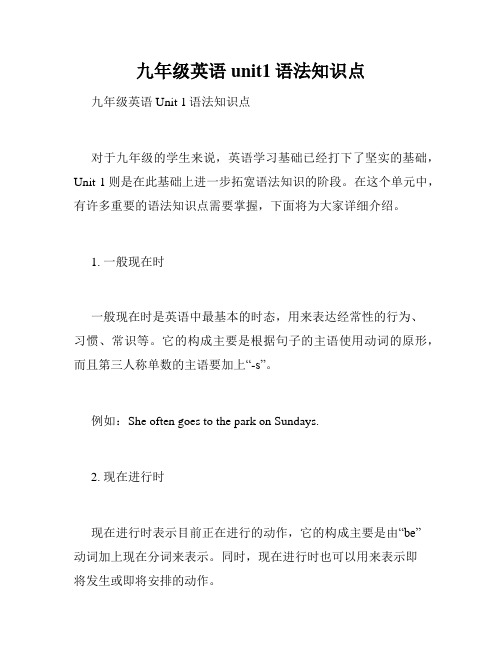
九年级英语unit1语法知识点九年级英语Unit 1语法知识点对于九年级的学生来说,英语学习基础已经打下了坚实的基础,Unit 1则是在此基础上进一步拓宽语法知识的阶段。
在这个单元中,有许多重要的语法知识点需要掌握,下面将为大家详细介绍。
1. 一般现在时一般现在时是英语中最基本的时态,用来表达经常性的行为、习惯、常识等。
它的构成主要是根据句子的主语使用动词的原形,而且第三人称单数的主语要加上“-s”。
例如:She often goes to the park on Sundays.2. 现在进行时现在进行时表示目前正在进行的动作,它的构成主要是由“be”动词加上现在分词来表示。
同时,现在进行时也可以用来表示即将发生或即将安排的动作。
例如:He is studying English in the library.3. 一般过去时一般过去时用来表示过去发生的动作或存在的状态。
它的构成主要是根据句子的主语使用动词的过去式,同时肯定句中要使用助动词“did”。
例如:They visited their grandparents last weekend.4. 过去进行时过去进行时表示在过去某个时间段正在进行的动作。
它的构成主要是由“was/were”动词加上现在分词来表示。
例如:I was watching TV when he called me.5. 一般将来时一般将来时主要用来表达将来的动作或事情。
它的构成主要是由“will/shall”加上动词原形来表示。
例如:We will have a picnic next Sunday.6. 情态动词情态动词可以用来表达能力、可能性、推测以及许可等。
常见的情态动词有can、may、must、shall、will等。
值得注意的是,情态动词后面的动词使用原形。
例如:You must finish your homework.7. 句型及从句九年级的学生还需要学习掌握一些常见的句型和从句的用法。
人教版九年级英语全一册unit1课文讲解(智能版推荐)
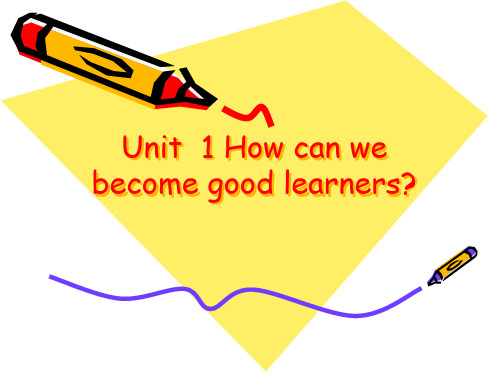
[dɪˈskʌvə(r)] v. 发现,发觉
[ˈsi:krət] n. 秘密,秘诀 adj. 秘密的,保密的
keep a secret 保守秘密
I did not understand these sentences at first. But because I wanted to understand the story, I looked them up in a dictionary.
Role-play the conversation
[ˌkɒnvəˈseɪʃn] n. 交谈,谈话 have conversations with sb
与某人谈话
Annie, I’m a little nervous. I have to finish reading a book and give a report next Monday.
Last year, I did not like my English class. Every class was like a bad dream. The teacher spoke so quickly that I did not understand her most of the time. I was afraid to ask questions because of my poor pronunciation. I just hide behind my textbook and never said anything.
That sounds difficult!
[ˈpeɪʃnt] adj. 有耐心的/n. 病人
be patient with sb 对某人有耐心
the+比较级, the+比较级 越…越…
人教版九年级全一册英语Unit1单元语法知识点总结
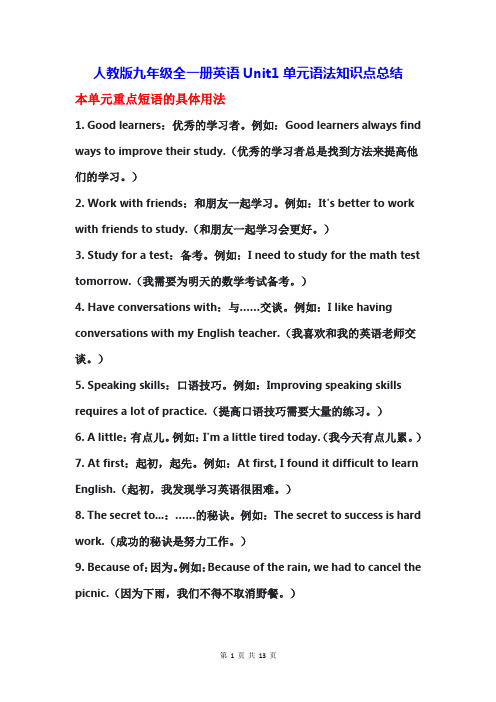
人教版九年级全一册英语Unit1单元语法知识点总结本单元重点短语的具体用法1. Good learners:优秀的学习者。
例如:Good learners always find ways to improve their study.(优秀的学习者总是找到方法来提高他们的学习。
)2. Work with friends:和朋友一起学习。
例如:It's better to work with friends to study.(和朋友一起学习会更好。
)3. Study for a test:备考。
例如:I need to study for the math test tomorrow.(我需要为明天的数学考试备考。
)4. Have conversations with:与……交谈。
例如:I like having conversations with my English teacher.(我喜欢和我的英语老师交谈。
)5. Speaking skills:口语技巧。
例如:Improving speaking skills requires a lot of practice.(提高口语技巧需要大量的练习。
)6. A little:有点儿。
例如:I'm a little tired today.(我今天有点儿累。
)7. At first:起初,起先。
例如:At first, I found it difficult to learn English.(起初,我发现学习英语很困难。
)8. The secret to...:……的秘诀。
例如:The secret to success is hard work.(成功的秘诀是努力工作。
)9. Because of:因为。
例如:Because of the rain, we had to cancel the picnic.(因为下雨,我们不得不取消野餐。
- 1、下载文档前请自行甄别文档内容的完整性,平台不提供额外的编辑、内容补充、找答案等附加服务。
- 2、"仅部分预览"的文档,不可在线预览部分如存在完整性等问题,可反馈申请退款(可完整预览的文档不适用该条件!)。
- 3、如文档侵犯您的权益,请联系客服反馈,我们会尽快为您处理(人工客服工作时间:9:00-18:30)。
1b Listen. How do these students study for a test?
Mei
Antonio
Pierre
1. Mei studies for a test by ____________________. making flashcards 2. Antonio studies for a test by _________________. listening to tapes 3. Pierre studies for a test by ___________________. help asking the teacher for
Ask and answer:
• 1. Do you often write vocabulary lists? • 2. Does your partner sometimes read English magazines? • 3. Do you often study grammar? • 4. Your partner never keeps an English notebook, does he ? • 5. Do you often listen to tapes? • 6. Does your partner ask the teacher questions? • 7. You often watch English-language ll in the blanks.
Girl 1: Welcome to the English club. Today we’re going to talk about the best ______ to learn English. ways Who has an _______? idea Boy 1: Do you learn English by _________ Englishwatching language vedios? Girl 2: No. It’s too hard to _________ the videos. understand Boy 1: What about keeping a ________ in English? diary Do you learn English that way? Girl: I think so. It helps me to write English every day. Girl 3: Have you ever ______ with a group? studied
1c PAIRWORK Ask your partner how he or she studies for a test.
A: How do you study for a test? B: I study by working with a group. How about you? C: I study by …..
Unit 1
How do you study for a test?
Have a free talk:
• 1. How long have you learned English? • 2. How many English words have you learned? • 3. How do you study English?
2
Listen fill in the blanks.
Girl 2: Yes, I have! I’ve learn a lot that way. Girl 1: Do you ever ________ conversations with practice friends? Girl 2: Oh, yes. It _________ my speaking skills. improves Boy 1: What about reading _________ to practice aloud pronunciation? Girl 3: I do that sometimes. I think it helps. Boy 2: I do too. And I always _____ _____ new words look up in a dictionary.
Wei Ming
Liu Chang
Read and answer:
• 1. What did they ask students at New Star High School about? • 2. What’s Lilian Li’s way to learn new words? • 3. Why does Wei Ming think watching English movies is a good way ? • 4. Why does Liu Chang think having conversations with friends isn’t helpful at all ?
By asking the teacher for help.
How does she study? By reading the textbook.
How does he study?
By making vocabulary lists.
She studies for a test by listening to tapes.
√
Listen and match the questions 2b with their answers.
1. _____ Do you learn English by √ watching English-language videos? 2. _____ Do you ever practice conversations with friends? √ 3. _____ What about listening to tapes? 4. _____ What about reading aloud to practice pronunciation? √ 5. _____ Have you ever studied with a group? √ a. Yes, I have. I’ve learned a lot that way. b. Oh, yes. It improves my speaking skills. c. I do that sometimes. I think it helps. d. No. It’s too hard to understand the voices.
3a Read the article and complete the chart. Ways of learning English Not successful Lillian Li studying grammar sometimes the people speak too quickly having conversations with friends OK memorizing the words of pop songs watching English movies Successful reading English magazines studying grammar joining the English club
完成句子: 完成句子:
1. 你是怎么为考试作准备的 你是怎么为考试作准备的? _____ do you ____ ____ ____ ____ ? 2.他是怎么学习英语的 他是怎么学习英语的? 他是怎么学习英语的 How ____ he ______ English? 3.我骑车上学. 我骑车上学. 我骑车上学 I go to school _____ ______. 4. 这些声音太难听懂 这些声音太难听懂. It’s ____ hard ___ to understand the voices
Check the ways you study for 1a an English test. Then add other ways you use sometimes.
_____ by working with friends
_____ by making flashcards _____ by reading the textbooks _____ by making vocabulary lists _____ by listening to tapes _____ by asking the teacher for help _____ ____________________________________
3a
•
Read and find the ways to learn English
• • • • • •
by using English by reading English magazines by memorizing the words of pop songs by studying grammar by watching English movies by joining the English club by having conversations with friends
I study English
by
…..
There’s an English test on Monday. Can you tell me how you study for a test?
By working with friends
By making flashcards. flashcards
5.你有没有通过听英文歌来学英语? 你有没有通过听英文歌来学英语? __ you learn English ___ ____ to English songs? 6.他通过制作词汇清单来学习西班牙语. 他通过制作词汇清单来学习西班牙语. He learns Spanish by ____ ______ ____. 你曾经和小组成员一起学习吗? 7. 你曾经和小组成员一起学习吗? ___ you ever ____ ___ a group? 他是怎样练习打篮球的? 8. 他是怎样练习打篮球的? How ___ he practice ______ basketball?
